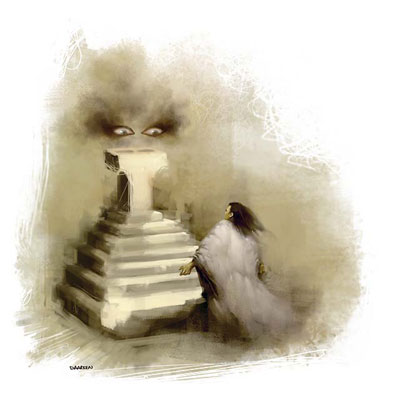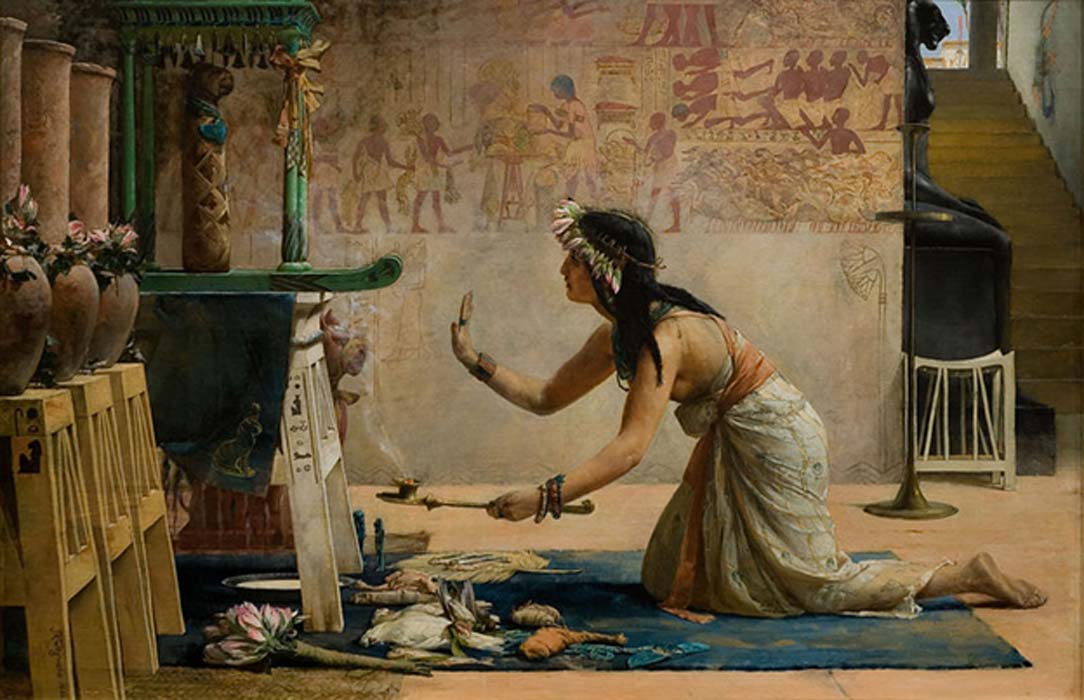Clerics and Deities

Clerics and Deities

|
|
|
|
|
|
When a DM is deciding which
gods will be commonly worshiped in his or her campaign,
he must be aware of the
fact that not all gods are equally powerful,
and that this affects their
ability to grant spells to their clerics.
As is explained in the DUNGEON
MASTER'S GUIDE, <>
1st and 2nd level spells
are gained only through the cleric's knowledge and faith.
All other spells are gained
through prayer.
Third, fourth, and fifth
level spells are granted by the supernatural servants or minions of the
cleric's deity.
These servants range up
to demigod level.
Clerics whose patrons are
demigods
(and no lesser or
greater gods) will receive their 3rd through
5th level spells directly from their deity.
A demigod cannot
grant spells above 5th level; so a cleric of a demigod could never receive
6th or 7th level spells.
Sixth and seventh level spells
spells are grantead to clerics directly from their deities.
Only the greater gods
may grant 7th level spells.
In each mythos included here,
the deities have been divided
into demi-gods, lesser gods and greater gods.
The DM may carefully consider
altering these designations if they do not suit his or her campaign or
concept of the deity.
Deities of all types,
from the highest to the
lowest,
expect a great deal of work
from their clerics in return for the power to perform miracles.
Clerics are expected to
behave in a manner exemplary of the teachings of their faith.
Even common everyday concerns
must be viewed in the light of their beliefs.
Clerics must stand out from
the common fold as role models of correct behavior,
exhibiting greater wisdom
and thoughtfulness,
and out out the precepts
of their religions and alignments.
The DM must also make sure
that the cleric is aware of his or her place in the community and the church
hierarchy.
Cleric "adventurers",
which includes nearly all
AD&D
PC clerics,
are often greatly respected
and admired (or feared) by the populace.
However,
due to their somewhat unorthodox
behavior,
they rarely have any important
place in their religion's hierarchy.
They are required to maintain
appearances and perform the proper rituals essential to their faith and
alignment,
regardless of their special
mission in life.
A cleric,
no matter where he or she
is,
acts as an agent and representative
of his or her deity.
The cleric should miss no
opportunity to explain and show to others,
through both word and deed,
the truth and rightness
of his or her religion.
When clerics rise to high
level,
they are often expected
to be judges,
interpreters and arbitrators
of the congregation's needs.
One of the more dangerous
functions of any cleric is that of pawn of the god he or she serves.
Clerics are sometimes required
to block the plans of the servants of other deities,
and they may even be sacrificed
for the ultimate goals of the god they serve.
In addition to the above,
there are other requirements
which a cleric must fulfill if he or she is to remain in good standing
with the patron god.
Depending upon the religion
(and the DM's decision),
certain rituals and services
must be performed,
sometimes at precise and
regular intervals.
The cleric should also freely
undertake the performance of exceptional duties in the form of quests,
heroism,
and even (if necessary)
voluntary martyrdom.
One important and sometimes
expensive duty of a cleric is the creation of places of worship for his
or her deity.
This could mean the building
of simple roadside shrines at low level,
while at a high level a
cleric might finance the construction of an entire temple.
These structures or areas
must be put in places of relative security,
for the desecration of a
temple is a terrible blow to a religion's honor.
There may come a time in
the campaign when a cleric may fall away from the path of the deity he
or she serves and need to be corrected or punished in some way.
Clerics using only first
and second level spells usually need fear little direct retribution from
their deity;
the god expects higher level
mortal servants to be aware of transgressions and to take the proper action.
In the case of higher level
clerics,
if the offense is minor,
he or she will often receive
a warning of some kind,
typically an unmistakable
omen of some sort.
These are usually sent by
one of the deity's servants.
If a cleric once again commits
a minor transgression or dereliction of duty,
the servants of the deity
(and the DM) may require that he or she appease them by engaging in one
or more of several types of penances.
If the questionable act
was unknowing or unwilling,
simple receipt of an atonement
spell may be sufficient.
If it was not,
several days of fasting,
prayer and meditation and/or
minor sacrifices may be necessary.
In certain religions,
this may include some kind
of scourging or physical punishment.
Greater and repeated transgressions
require greater expiation to atone for them.
The erring cleric may have
to make a major sacrifice,
probably including money
and magic items,
and he or she may even be
given a minor quest of some sort.
Some religions even require
public degradation and humiliation for the cleric as recompense for his
or her sins.
Until the atonement period
has been completed,
use of certain spells or
spell levels may be denied the cleric.
Grave transgressions require
grim punishments.
A cleric who commits a grievous
sin against his or her god may have to sacrifice all of his or her possessions
and then go on a major quest in order to restore good standing.
During this period use of
many or even all spells may be denied the errant cleric.
Commission of irredeemable
sins or terrible heresies,
of course,
will result in immediate
and total excommunication of the cleric:
that person may never again
use clerical spells in the name of that deity or hope for aid or safety
from his followers.
The worst of these acts
may also invoke divine wrath upon the head of the offending one.
Divine vengeance upon one
who has betrayed his god can take many forms,
each one worse than the
previous.
The above, of course,
are rare cases.
A faithful and true cleric
does not balk at the tasks necessary for proper worship,
and does not even consider
committing actions which oppose those of his or her alignment and religion.
The path of truth for most
clerics is narrow but well-marked.

![]()
(?)
As is explained in the DUNGEON
MASTER'S GUIDE, 1st and 2nd level spells are gained only through
the cleric's knowledge and faith. <>
Clerics whose patrons are
demigods
(and no lesser or
greater gods) will receive their 3rd through
5th level spells directly from their deity.
A demigod cannot
grant spells above 5th level; so a cleric of a demigod could never receive
6th or 7th level spells.
Only the greater gods may grant 7th level spells.
If the questionable act was unknowing or unwilling, simple receipt of an atonement spell may be sufficient.

DMPrata wrote:
Gary, waaaaaaaaaaaaay back
in DRAGON® #71, you introduced Kelanen, the Prince of Swords (designed
with François Marcela-Froideval, if I recall correctly) as the prototypical
"Hero-Deity" for the WORLD OF GREYHAWK®.
He was later reprinted in the '83 boxed set. Now, when compiling Deities
& Demigods™, Jim Ward — I believe it was he — established the rule
that demigods could grant clerical spells of up to 5th level; lesser gods,
up to 6th level; and only greater gods could grant 7th level spells. (I
don't know whether or not you approved of such a rule, but I'm operating
under the assumption that you did.) If it's not already glaringly obvious,
here's my question: Did you intend for the hero-deity Kelanen to have clerics,
and be able to grant spells to them? If so, what level of spells would
he be able to grant?
(P.S. — I hope to have an
order in to the Trolls this weekend for the required "Gygaxian Fantasy
Worlds" books. Don't count me out of the YGGSBURGH Expanded Details project
just yet! ![]() )
)

Felicitations!
Well, the rule regarding granting od spells is not one that I approved, and I would not deny any considerable deity the ability to grant spells of any level to one of his clerics within the region of that deity's worship. That's really a call for each DM to make, IMO.
As to Kelanen the Sword Lord, you have it right. In this case, the entity being a demi-deity and a rather specialized one at that, I should suppose that any of his clerics would be sword-slingers and have limited spell capacity beyond those used to honor Kelanen and perform services to him. Perhaps in addition to a specialized spell gained at each level they might be able to employ regular clerical spells of 1st through 3rd level, few, and gain in level happening in stages of around 4 levels, so one 1st level spell beginning at 1st level, four at 4th, and a 2nd level spell gained at 5th, etc.
As the Ip belongs to WotC, I will not attempt to suggest the special spells that such clerics would gain, one per level, but any imaginative DM can surely create them without my assistance, for the nature of the deity directs the sort of cerics he would have servinghim, and thier abilities.
Cheers,
Gary
Quote:
Originally Posted by solomanii
And another question that
just occured to me quoting you;
"That meant that their cleric
would be dedicated to Boccob, and
the fighters and others,
wanting the benefits of clerical ministrations
came along for the ride
Boccob was never an active deity in play, and none
of the PCs was eager to
have Zagyg intervene..."
So did the clerics not help party memebers of different beliefs?

Yes, clerics of deities
not honored by someone needing assistance were generally aided, but at
the cost of a "donation" to advance the work of the particylar faith of
the cleric.
The main fun was having clerics
of different dieties argue theology,
and debates between one
of St. Cuthbert and another of Pholtus always ended up in a test of which
would prevail by a bonk on the head or temporary blinding.
The players had a good sense
of humor <paranoid>
Gary

Howdy Sluggo,
Sounds that the other PCs are indeed presuming far too much on the kind offices of your cleric. In all, the worker is worthy of his hire, and to continue to do his good work, the cleric should receive both respect and contributions.
He might explain that his ministrations are limited by his capacity to inact spells, and those spells are granted to him by his deity. The latter is quite upset at the disrespect being shown him (or her) by the other PCs who are treating his (or her) clerical servant as their servant. That belittles the deity, and unless attitudes change immediately, generous cointributions to the priest are made in return for his services on behalf of the deity, no more spells will be forthcoming.
If the deity is speaking through the cleric, and it would under such circumstances, how can the others demure? If they do, they should risk rather severe retribution.
FWIW,
Gary
Quote:
Originally Posted by RFisher
Is there only one language
for each alignment or does each "religion" within an alignment have it's
own language?

I always imagined a single
alignment language per division, as in the D&D milieuneach alignment
is relatively homogenous.
Servants of particular deities
will have recognition signals or spoken or signed sort.
Cheerio,
Gary